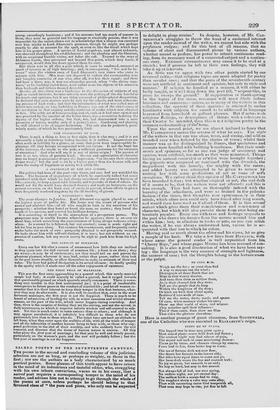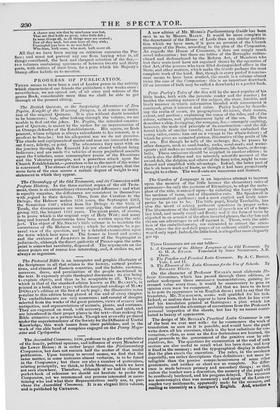SALRED POETRY OF THE SEVENTEENTH CENTURY.
THE poems in the second and concluding volume of this judicious selection are not so long, or perhaps so weighty, as those in the first ; nor are the authors as a body characterized by so much poetical genius. Some gleams of this truth appear to have arisen in the mind of its industrious and tasteful editor, who, struggling with his own inborn convictions, warns us in his essay, that a sacred poet requires a corresponding temper in the mind of his reader, and advises him not to attempt to go through the whole of the poems at once, unless perhaps he should belong to that favoured class of " the pure and pious, who only can be expected' to delight in pious strains." In despite, however, of Mr. CAT- TERMOLE'S struggles to throw the want of a sustained interest upon the reader instead of the writer, we cannot but side with the profanum vulgus; and for this best of all reasons, that no volume of short and disconnected pieces by various authors, whether sacred or profane, has power to attract continuous read- ing, from its necessary want of a connected subject and a continu- ous story. Extrinsic circumstances may cause it to be read at a stretch ; but if persons be left to their own feelings, they will take it up at intervals. As little can we agree with two other points started by our reverend critic,—that religious topics are more adapted for poetry than secular ones ; and that the poets of the seventeenth century were not artificial in sentiment and opinion, but only in style and manner." If religion be handled as a science, it will either be badly taught, or it wi'l drag down the poet till, " serpent-like, in prose he sweeps the ground." If supplication or thanksgiving be the topics of the verse, reverence will most likely induce heaviness and sameness,—unless, as in many of the writers in this collection, the opposite of those qualities is attained by undue familiarity with subjects too sacred to be addressed in language borrowed from household or gallant phrases. But if actors with religions feelings, or descriptions of things with a reference to their Creator be intended, then this is mit religious poetry in the common understanding of the*term. Upon the second point, we are almost inclined to fancy that Mr. CsrrEitmoLE means the reverse of what he says. The style. of the writers in that age was close, terse, and strong, and seldom inverted save when fettered by the chains of verse ; whilst their manner was so far distinguished by fitness, that quaintness and conceits were handled with befitting homeliness. But their senti- ments and opinions, so far as one can judge of sentiment and opinion, were artificial, inasmuch as they were unnatural. Things having no natural connexion or relation were brought together ;: the gigantic was compared or combined with the dwarfish, the magnificent with the homely, the mighty with the mean; and added beauty was attempted to be given to nature by uniting her with some productions of art or some of arils operations. We rather think this opinion of Mr.CATTERMOLE has been broached before; but whether original or not, the real drift of it seems to be, that the writers were not affected ; and this is true enough. They had been so thoroughly imbued with the learning of the schoohnen, and were so trained in the pedantic fashion of the times, that thoughts rose spontaneou,ly in their minds, which other men could only have found after long search, and would then have used as if afraid of them. It is this second!' nature which gives them their completeness and consistency of character, but which will also prevent them from ever being ex- tensively popular. Every one with eyes and feelings responds to the poet who draws his images from the nature around him and within him ; but, in allusions to books or arts, no one can relish the writer, if he can always understand him, unless he is ac- quainted with that lore to which he refers.
Having said so much about the editor and his views, let us give a sample of his book. We take a few lines from HERRICK, with whose name the general reader is well acquainted from his, " Cherry Ripe," and whose pages Mom.: has been accused of con- sulting. It is also a good illustration of what we have been say- ing : the language is the very essence of strength and lightness, the manner of ease; but the thoughts belong to the lecture-room or the pulpit.
TO FIND •CD.
Weigh me the fire ; or canst thou find A way to measure out the wind ; Distinguish all those floods that are
111ixt in that watery theatre, And taste thou them as saltless there,
As in their channel first they were.
Tell me the people that do keep Within the kingdoms of the deep ; Or fetch me back that cloud again, Beshiver'd into seeds of rain.
Tell me the motes, dusts, sands, and spears Of corn, when summer shakes his ears; Show me that world of stars, and whence They noiseless spill their influence:
This if thou canst, then show me Him
That rides the glorious elm ubim.
Here is another passage of great closeness, from Soon-mm.1, one of the Catholics who was executed in ELIZABETH'S reign.
TIMES GO BY TURNS.
The lopped tree in time may grow again ; Most naked plants renew both fruit and flower ; The sorriest sight may find release of pain, The dryest soil suck in some moistening shower: Times go by turns, and chances change by course, From foul to fair, from better hap to worse.
The sea of fortune loth not ever flow, She draws her favours to the lowest ebb; Her tides have equal times to come and go, Her loom Both weave the fine and coarsest web : No joy so great, but runneth to an end ; No hap so hard, but may in fine amend.
Not always fall of leaf, nor ever spring, No endless night, nor yet eternal day : The saddest birds a season find to sing, The roughest storm a calm may soon allay. Thus with succeeding turns God tempereth all,
That man may hope to rise, yet fear to fall.
A chance may win that by mischance was lost, That net that holds no great, takes little fish ; In some things all, in all things none are crossed ; Few all they need, but none have all they wish; Unruingled joys here to no man befal :
Who least, bath some, who must, hath never all.
All that we have been saying on criticism concerns the Pre- face; and must not prevent any one from buying what is, all things considered, the best and cheapest selection of the day,— two volumes containing specimens of between twenty and thirty poets, with notices of their lives, for a price which his Majesty's Stamp-office forbids us to mention.



























 Previous page
Previous page